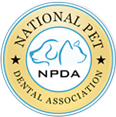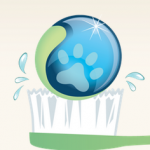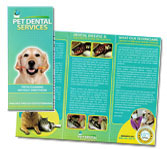“The services provided by Pet Dental Services have proven to be invaluable to our practice. Our clients appreciate the safety and convenience that non-anesthetic dentistry provides to their pets. Pet Dental Service’s staff is incredibly kind and patient with the pets in their care. Even some of our fearful patients are able to benefit from a full dental cleaning due to the gentle care provided by the PDS staff.”
Improve Canine Dental Health from Home with 5 Easy Tips
Canine dental health is a very important part of a dog’s wellbeing. Your canine depends on their teeth so maintaining good oral hygiene is essential to keeping them healthy. It’s imperative that you take your dog to a veterinarian to get their teeth cleaned. However, there are some tips that can help you maintain your dog’s healthy teeth throughout the year and prevent problems from creeping up.
Tip 1: Brush their Teeth
Brush your dog’s teeth just as you would your own. Start by purchasing a canine toothpaste, as you cannot use human toothpaste because the levels of fluoride are too high. Allow your dog to taste the paste by putting it on your finger a few days in a row to get them acclimated to the taste. Next, use a soft bristled toothbrush or finger toothbrush designed for pets to help remove any excess food from your dog’s teeth. It is recommended that you brush your dogs teeth daily. It is important to start brushing when the dog is young and easier to train and always use positive reinforcement like treats and walks to make the daily routine more enticing.
Tip 2: Canine Oral Rinse
Another great step to ensuring your canine’s dental health is using a pet oral rinse. These pet oral rinses benefit your dog in a similar way to mouthwash for a human. The oral rinse will help fight plaque and helps to reduce inflammation caused by bacteria in the mouth. You can apply the oral rinse by putting it on a tissue and then dabbing it on your dog’s gums. The oral rinse is safe to use daily and is a great compliment to brushing although it does not replace the brushing.
Tip 3: Canine Dental Health Treats
Canine dental health treats are sold in most pet supply stores and promote healthy teeth. Canine dental health treats can help promote chewing (on the right things!), and help build strong jaw muscles and help to eliminate plaque forming bacteria. Dental dog treats come in many sizes so make sure you purchase the right size for your canine. Also, supervision is recommended to ensure your dog will chew the treats appropriately.
Tip 4: Pay Attention to What your Dog Eats
Another thing to consider is debris; dogs will eat almost anything including rocks and sharp objects. Your canine can fracture their teeth or lacerate their gums on almost anything which can cause serious dental issues. Also, debris can get stuck in between teeth and lead to ulcerations and recession of the gums. Keep trash and yard debris out of the reach of your pet to reduce the opportunity for inflammation or cuts in their mouth.
Tip 5: Stick to Dry Dog Food
Your dog’s diet not only affects their overall health, but affects canine dental health as well. Stick to nutritionally balanced dog foods. Be sure to ask your vet before making changes to your dog’s diet. Although dry dog food might not seem appealing to us, it does help remove tartar in your dog’s mouth. That means they will eat and clean their teeth at the same time. Moist foods tend to stick to your dog’s teeth and gums almost like glue thus creating a breeding ground for bacteria and should be avoided if possible. There are a variety of dog foods on the market including specialty formulated dental diets and pet foods for senior’s dogs that help promote canine dental hygiene.

 Dr. Melissa Byers
Lake Forest Animal Clinic
Lake Forest, CA
Dr. Melissa Byers
Lake Forest Animal Clinic
Lake Forest, CA







